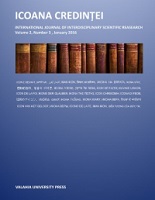AN EVALUATION OF RELIGIOUS SKEPTICISM IN RELATION TO HUMAN SUFFERING AND PAIN: TOWARDS A THEODICAL SYNTHESIS
AN EVALUATION OF RELIGIOUS SKEPTICISM IN RELATION TO HUMAN SUFFERING AND PAIN: TOWARDS A THEODICAL SYNTHESIS
Author(s): Peter O. O. OttuhSubject(s): Philosophy of Religion, Sociology of Religion
Published by: Ideas Forum International Academic and Scientific Association
Keywords: Religious Skepticism; Human Suffering; Pain; Theodical Synthesis;
Summary/Abstract: The issue of human suffering and pain might be seen as a variant of the basic problem of evil. The evidential question of evil has been a heated topic in the philosophy of religion. In this sense, some skeptics question whether religion is a legitimate topic for criticism since faith is not based on evidence. This understanding of the problem of evil indicates that God is unlikely to exist, given the reality of senseless suffering and pain among humans. Hence, in some religions, suffering and pain are regarded as the only manifestations of evil in light of divine justice and compassion. Hence, it can be inferred that suffering and pain have both positive and negative functions in that they lead to the development of human noble character. The research is aimed at evaluating religious skepticism in relation to human suffering and pain, with the end-goal of arriving at a theodical synthesis. As a theoretical research that is literature-based, the historico-critical review method was adopted. The research argued from the theoretical viewpoints of fideism, naturalism, and evidentialism and discovered how religious skepticism, with its inherent distrust of the supernatural, prevents people from having a loving and personal relationship with any deity whose motives are unknown. It concluded that suffering and pain are possible catalysts for a search for meaning in life and God, as well as a test of faith, hence, religious traditions should not restrict medical interventions.
Journal: ICOANA CREDINTEI. International Journal of Interdisciplinary Scientific Research
- Issue Year: 8/2022
- Issue No: 16
- Page Range: 50-61
- Page Count: 12
- Language: English

